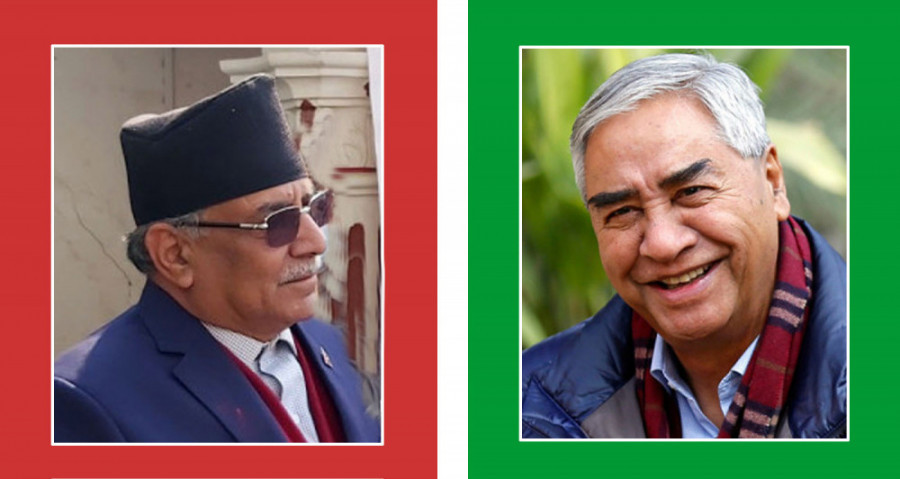Politics
Dahal stakes formal claim to government leadership with Deuba
With the Maoist chief’s proposal, negotiations on new government formation have entered a decisive stage.
Purushottam Poudel
President Bidya Devi Bhandari is considering calling the political parties to put forward their claims to form the next government forthwith.
According to officials at the President’s office, Sheetal Niwas, President Bhandari is not in favour of any delay in calling the parties to submit their claims for government leadership by showing that they have the support of a majority of parliamentarians in accordance with Article 76 (2) of the constitution.
“The President has not yet decided on a specific day. However, she will very soon call the parties to stake their claim for government,” Tika Dhakal, press expert to President Bhandari, told the Post.
As no party has 138 seats in the 275-member House of Representatives to form the government as required by Article 76 (1), the President will administer the oath of office and secrecy to a lawmaker as prime minister who shows majority in his/her favour with the support of two or more parties as per Article 76 (2) of the constitution.
Article 76 (2) states: “In cases where no party has a clear majority in the House of Representatives under clause (1), the President shall appoint as the prime minister a member of the House of Representatives who can command majority with the support of two or more parties represented in the House.”
While President Bhandari is preparing to call the political parties to form a new government, the ruling alliance which together has the numbers close to the majority mark in the House, is still undecided on who leads the new Cabinet.
Bhandari is taking the initiative as no leader has yet come forward to stake a claim for government leadership showing a majority of lawmakers backing them.
In 2017, a day after the Election Commission submitted the final election result to the president, CPN-UML chair KP Sharma Oli had gone to Sheetal Niwas with the support of his party UML and the Maoist Centre that jointly commanded a clear majority in the House. Bhandari had then promptly appointed Oli as prime minister.
But this time the picture isn’t as clear. Prime Minister Sher Bahadur Deuba, who is also the president of Nepali Congress that emerged the largest party in November polls, and CPN (Maoist Centre) chair Pushpa Kamal Dahal, another major partner of the Congress-led coalition, seemed to be at loggerheads over who leads the government first.
Meanwhile, Dahal has, for the first time since the publication of results of the November 20 elections, staked his claim to prime ministership. Dahal made the claim during a meeting with Prime Minister Sher Bahadur Deuba on Saturday morning.
Later in the afternoon, Nepali Congress spokesperson Prakash Sharan Mahat confirmed Dahal’s claim. He said: “Dahal in his meeting with Prime Minister Deuba on Saturday morning has formally sought the support of Nepali Congress to become prime minister in the first half of the five-year term.”
While forging an electoral alliance ahead of the November 20 polls, Deuba and Dahal had reportedly struck a ‘gentleman's agreement’ on leading the government by turns.
Mahat said while Dahal’s proposal was to be expected, it would be more natural for Nepali Congress, as the largest party to emerge from the elections, to lead the government.
Dahal has been projecting himself as a claimant for the executive head since much before the elections in public forums.
Deuba, who is the front-runner to become the prime minister for the sixth time, “has not given Dahal any definite answer”, a source close to the prime minister told the Post.
The ruling coalition, which has decided to remain intact to form the next government, has multiple prime ministerial aspirants, especially from the Congress.
During the election campaign, at least half a dozen senior Congress leaders had disclosed their intent to fight for the prime ministerial position should they win the election. The Congress is struggling to elect its parliamentary party leader as per the party statute.
Despite his party winning fewer seats this time, Dahal was encouraged to stake his claim to the leadership of a new coalition after the UML started luring him with its own promise of support for his prime ministerial bid, sources say.
Congress leaders close to Deuba, meanwhile, have cast doubts over Dahal's latest claim.
“Some second-rung Maoist leaders close to Dahal are in constant touch with UML leaders and they are using the prime ministerial position as the bargaining chip to build pressure on the ruling coalition,” said a Congress leader close to Deuba.
However, Maoist Centre leaders say they are unhappy with some of their Congress counterparts trying to undermine their party’s role in government formation based on the number of seats the Dahal-led party won.
The Maoist party performed badly in the November elections as it stood a distant third, winning only 32 seats in the House of Representatives. It had won 53 seats in the same House in the 2017 elections.




 8.79°C Kathmandu
8.79°C Kathmandu














